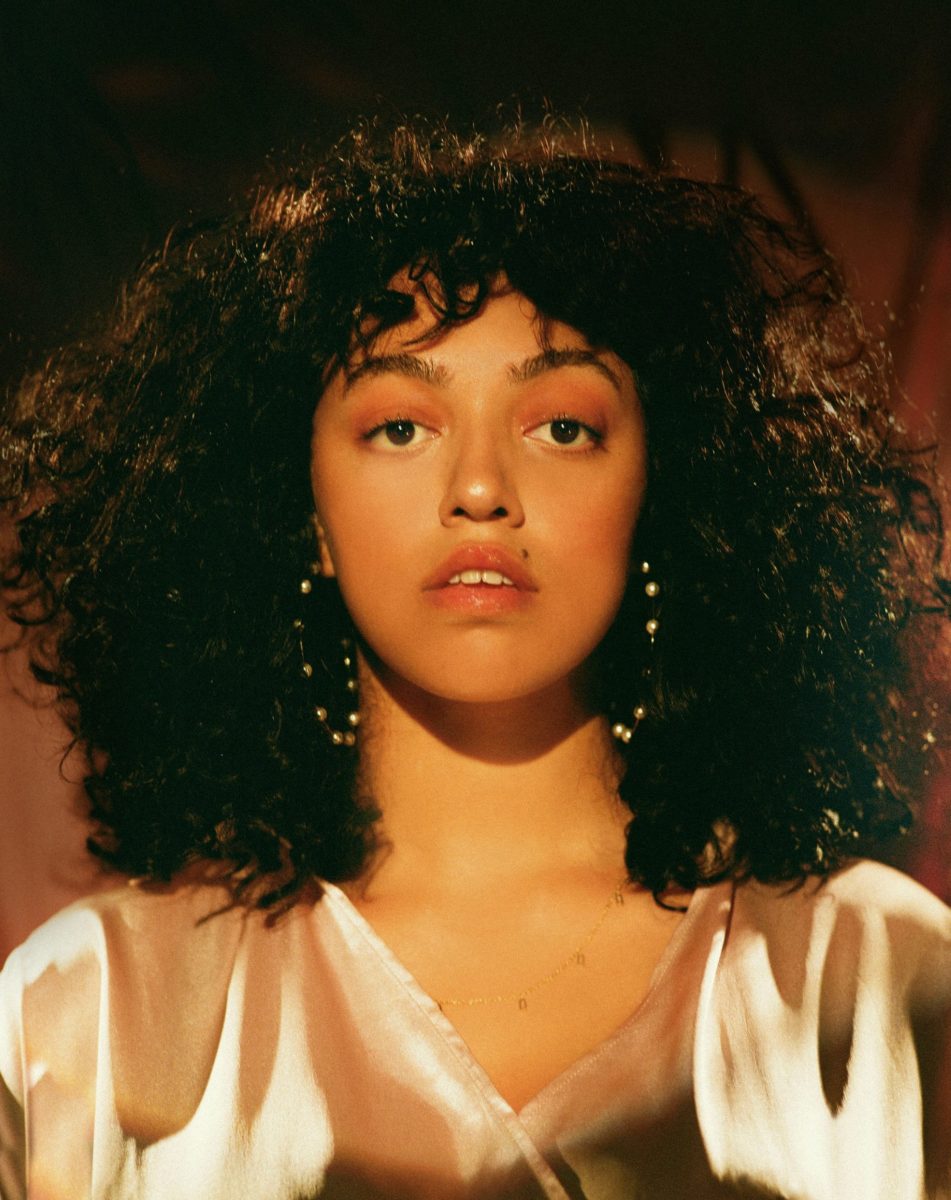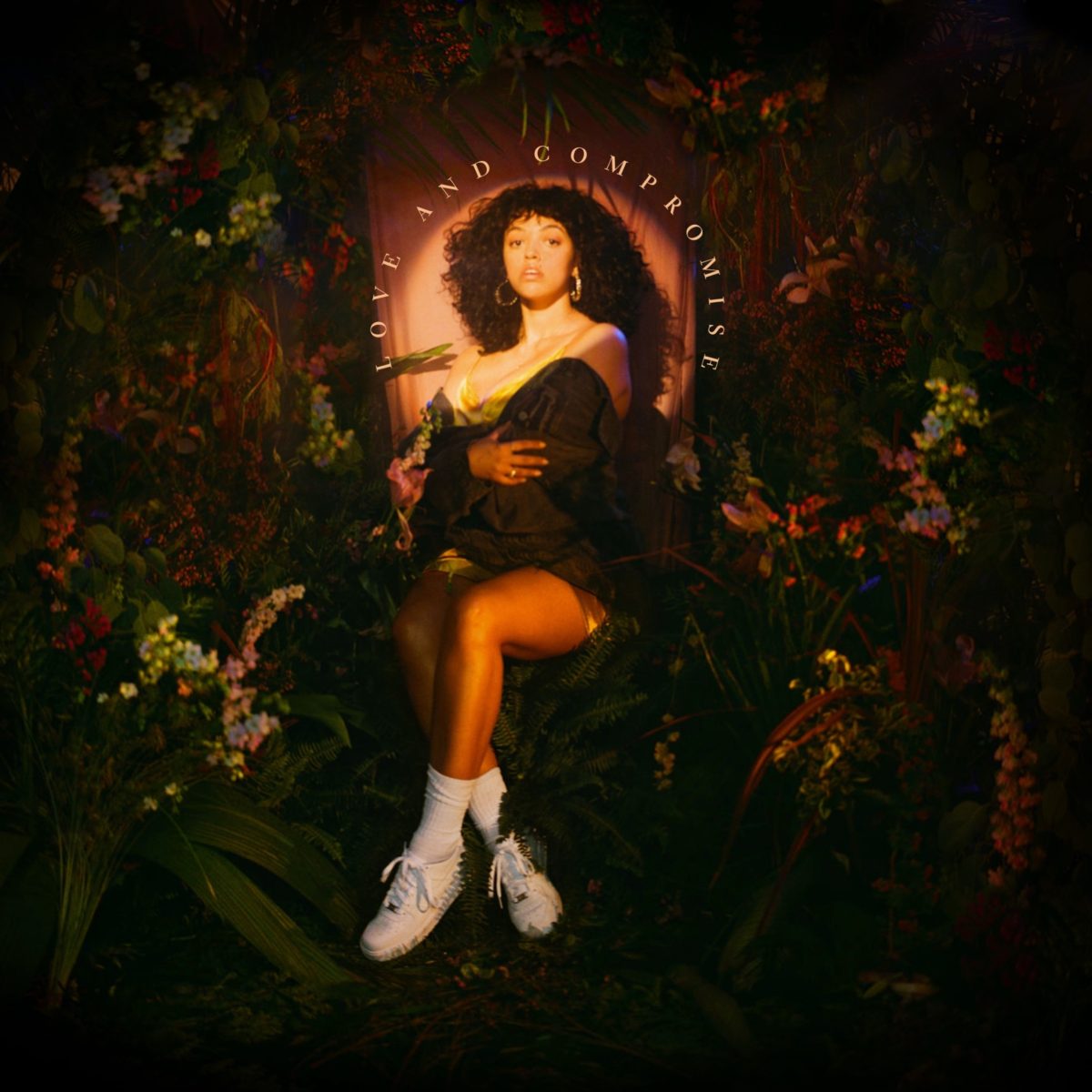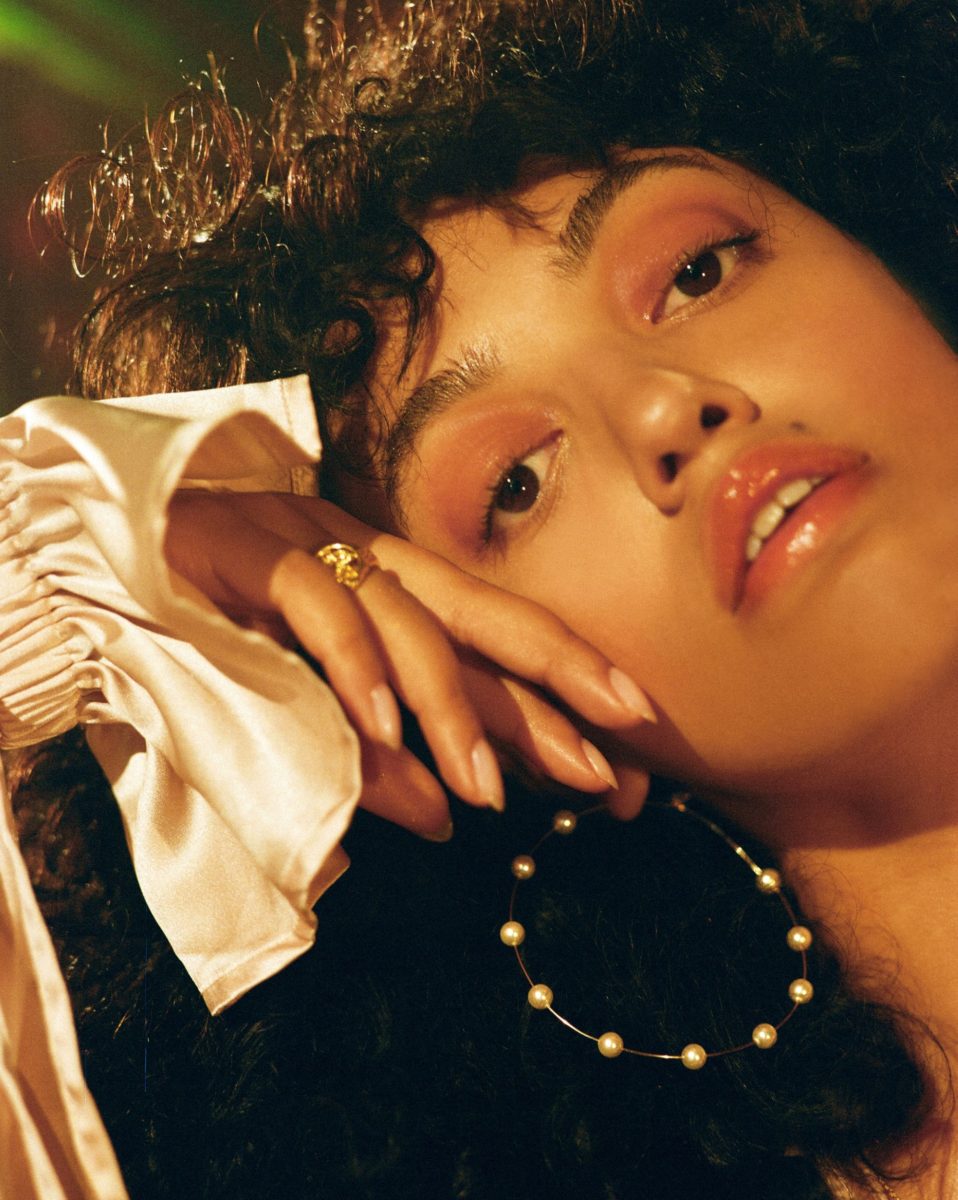Mahalia appears at the front of her tour bus. She’s wearing camouflage cargo pants, white Air Force One sneakers and a Northface puffer jacket. She has her curly hair piled atop her head in a messy bun, and the hood on her oversized black sweater is tightly framing her face. Wasting no time, Mahalia comes over to say hello to the Urbanology team and asks if anyone wants tea. “Pardon my appearance,” she says, as she finds a place to sit on the bus and pulls one of her knees up to her chest. “I’m feeling a little under the weather today.”
It doesn’t take very long after that for her and her manager Ben to spark up a conversation and make everyone feel right at home. In these moments, it’s easy to forget that she’s one of the UK’s rising music stars and not just a regular 20-something from around the way.
Born and raised in a small town called Syston in Leicester, United Kingdom, Mahalia Burkmar showed a knack for music at a young age. By the time she was 13, she released her first single “Let The World See Your Light,” which ultimately drew the attention of a then-burgeoning Ed Sheeran. Following a few appearances on his tour, Mahalia was signed to Asylum Records and became Sheeran’s label mate. She released her first project Diary of Me in 2016 but it wasn’t until 2017 when she released the single “Sober” that things really picked up steam. The growing popularity of the smooth alternative R&B track landed her a performance on the popular YouTube music platform COLORSXSTUDIO and nothing has been the same since.
Her interview with Urbanology is just a few hours shy of her sold-out tour stop at the Mod Club in Toronto. The last time she was in the city was a year ago, and she performed for a much smaller crowd at The Garrison. Sold-out shows are quickly becoming the new norm for the 21-year-old. Over the past two years, the singer has become one of the forerunners of the UK’s R&B and soul resurgence. At the time of writing this, her COLORSXSTUDIO performance on YouTube has over 37 million views. She has been named one of 2019’s Ones To Watch by both Metro UK and MTV Push. She has also just landed a Best New Artist nomination for the Soul Train Music Awards.
This past September, Mahalia released her official debut album Love and Compromise, which landed at #22 on the UK iTunes chart. The soulful and self-aware record is a triumphant entrance to mainstream music and displays the beauty in the songstress merely being herself. While many artists find themselves changing their sound in search of a hit, it seems Mahalia has mastered making her honesty and her sound sell itself. It feels then almost fitting that the opener for her album is a 1982 clip of Eartha Kitt speaking on romance where she says, “Compromise? What is compromise? Compromising for what?” While Kitt may have been discussing love and relationships, the same quote is relevant to Mahalia’s sound. If her current project is an indicator of what’s possible when she is uncompromising with her music, it’s safe to say Mahalia is just getting started.

I think we all compromise in relationships. If I didn’t compromise, then that would mean I would always be right.
The title of your album, Love & Compromise, was inspired by a clip where Eartha Kitt interviewed on the same topic. How do you feel your perspective has shifted on relationships since seeing that interview?
I first saw it like four years ago. [And] when I first saw it, I didn’t take it negatively, but I definitely was like, “ooh, she’s telling me not to ever compromise in a relationship.” So I think that maybe I was a bit confused at the beginning. But when I was writing the album, and I was being inspired by it — because I used to watch it every day — I soon realized that actually when she says, “I fall in love with myself and I want someone to share it with me,” compromise is all about respect and mutual respect as opposed to compromising myself … It’s about being in a healthy, loving relationship.
I think we all compromise in relationships. If I didn’t compromise, then that would mean I would always be right.
On your album, you tend to sing lyrics like “If I was you, I’d feel lucky” and “I’m the prize.” I love that! Did you always have that level of confidence?
Oh no! Sometimes when I write like that, it’s me trying to speak it into existence. So even though I wrote that at the time, in that particular situation, I didn’t feel confident. But by me saying it, I was manifesting it in myself … I remember I had this friend who used to always text me, saying, “You’re amazing,” and I was like, “Why do you do this every single day?” And I realized that it’s all manifestation, [and] then by doing that I started to believe I was amazing.
Another song that stands out for its lyrics is “Regular People”. Why was it essential for you to include a song like that on your album?
I think “Regular People” was important because of two things. First of all, I think we don’t talk about loving ourselves enough in the way of loving all of ourselves … I think one thing that we underestimate is how much humans want to relate to each other. So with “Regular People,” I’m like we’re all in this room, and for four minutes nobody’s thinking about gender, colour, sexuality, class, anything, language. Everybody’s just like “this is how I feel,” and I’m really trying to put that out there.
I’m from a dual-heritage family. I’ve got a lot of friends whose sexuality is different from mine. I’ve got friends from all different countries. I’ve dated different kinds of guys. So for me, I’m always trying to make that normal and make it like we’re f**king people, we’re human beings trying to co-exist.
I noticed on your social media that you often have your friends and family over and play your music for them. How does it feel having your family and friends support your music career so much?
It’s amazing … I realized I had all these pockets of friends everywhere who just f**king loved me for who I was, and I loved them all equally, and it’s only really this year that I realized how much support I have. Like I brought my best friend on tour, and we went to school together for five years … So I really like that my friends are people that I grew up with because it’s like this is who I am, and I keep trying to show people who I am.
On your album, you have all these very different samples from the Beenie Man sample to the Dipset sample. What were some of the genres or artists that influenced your music coming up?
I was really influenced by a lot of women. When I was a bit younger, I really loved the greats that every R&B singer talks about. I loved Lauryn Hill and Erykah Badu, but I was more interested in the kind of underground ones. Like I loved India Arie, Angie Stone and Jill Scott. My parents played a lot of reggae around the house, which is how I found dancehall and afro beats and bashment. I was really influenced by that, and because my mum’s family is from Jamaica, I spent [a lot of] time in Jamaica. So for me, I was just absorbing my own culture. But then I listen to a lot of dance music, and I listen to a lot of folk music, which is weird, but I find it really inspiring. Folk music is storytelling, and regardless of the genre, I see myself as a storyteller.
You’ve also been signed to a label since you were 13. How do you feel like your earlier career shaped you? Do you feel like you were more prepared?
Yeah. Definitely by the time that things started taking off, it was two years ago, so I was prepared. At that point, I’d been working in music for seven years. So yeah, man, I felt that I was ready to just go. Whereas I think if that had happened five years ago, I wouldn’t have been ready. I had to leave school at 18. I had to learn all my stuff from school and meet the boys and do the city stuff and then from 18 to 20 I needed that time to find my feet. By this point I left school and I was trying to move to London. So it was a two year period of me trying to work out how I was going to live and move forward. Then when I was 20, everything started blowing, and I was like, “what? This is mental.” But it felt like a long time coming. When you think about it, I think it’s just ’cause I was young. Whenever I tell people that I started when I was 12, and now I’m 21, they think, “oh, it’s not that long.” I’m like it is, though! When you’re a teenager, it’s like 12 years? That feels like that was a hundred years ago.

There is always a place to go. So I definitely want to level up, and yeah, I want to be “Top Girl”.
In the past two to three years, things have really picked up steam from your single “Sober” and flash forward to now. How have you been dealing with all of your recent success?
I don’t really deal. I just don’t even think about it. What I was taught was to always lower my expectations so that when they’re exceeded, it always feels good. I don’t walk into anything expecting things, and my dad always taught me to never expect anything from anyone. So for me, I definitely feel prepared, but it’s weird. It’s weird to be on a tour bus for starters. I’ve always travelled in a way where I’m flying, and I’m tired all the time, so this is strange. It’s weird to go out to a sold-out room every night. I’m not used to that, and it’s weird to get back to my bus, and there’s like over 40 screaming girls outside. It’s strange, but I’m loving it. I just think I wished for this for so long, and I had a hard time when I didn’t think it was going to happen. So then to have it, I’m like this is meant to happen, and no one is getting me off this train. Nobody’s getting me off this one.
Speaking of which, R&B music from the UK really seems to be on the rise right now, and you’re one of the people at the forefront of that. Where do you want to take things going forward?
Me? I just want to keep surprising people. Somebody recently called me “Top Girl” ’cause you know there is “Top Boy” and this guy, he’s like I think you’re “Top Girl”. And I was like, yeah, I think I could be “Top Girl”. I’m a Taurus, and I’m fiercely loyal, and I’m sensitive, but I’m competitive. And for me, I just want to be the best, 100 per cent. It’s the first time I’ve ever said that in my life, but it’s me trying to be truthful. And I’m not saying I want to be the best [physically]. I don’t give a f**k about looks. I’m just talking about as an R&B artist coming out of the UK. I want to be the best storyteller or the best performer and the best human in general. I just want to hone in on my craft and try to make myself better. I just want to level up basically. I always want to be levelling up. I remember seeing a video of Kanye West saying there’s always another level. Was it Kanye or Jay Z? It was one of the two, but I remember being like this is amazing. That there is always a place to go. So I definitely want to level up, and yeah, I want to be “Top Girl”.
With Love & Compromise, I noticed that the songs seem to cover all the different aspects of love. What was your process of putting the album together?
I was definitely trying to tell different stories. I kind of get frustrated around that stupid f**king stereotype that women only write about love. Because I’ve had so many interviews—and it’s usually guys who will go, “are you only ever going to talk about love?” And I’m like, but I talk about it so well, why the f**k would I talk about anything else? Also, love is not one-dimensional. “Regular People” is about love. It’s about loving yourself. For me, it’s important for me to always try and be telling a different story. So it was a conscious decision to make sure that not one song just sat together. That’s why I put “He’s Mine” and “Karma” next to each other because it’s the same thing. Because when I wrote “He’s Mine,” I was like, I would be lying if I didn’t tell the other side of the story because I’ve been there. I think it goes, “Karma,” “He’s Mine” and then “What You Did,” and I remember talking to my mum, and she was just like, “I love this transition.” Because we’ve got “Karma” where this guy’s got a girl, and we’re trying to get him. And you got “He’s Mine” where now he’s with you, and you’re shouting at the girl to back off. But then you got “What You Did” when he does it to you. That’s why those three lined up together just to show those different moments and how it could go. How it might go, you know, so I love it.
Photos supplied courtesy of Warner Music Canada




Comments are closed.